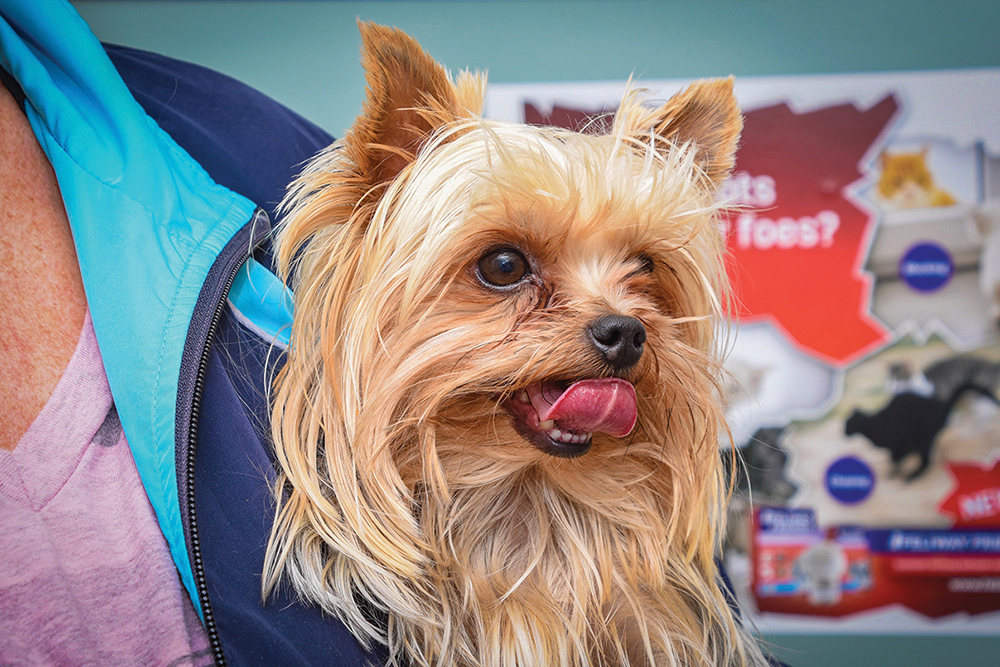After-hours pet crises expose the cracks in emergency veterinary care.
by Dianne Rinehart // photography by Roger Klein


My sweet dog, Daisy, has tried to eat a lot of things in her life, ranging from rabbit poo to a mouse (whole). But she chewed off more than she could swallow when she encountered a porcupine on the Margaret Paul Side Trail in the Blue Mountains on the Sunday of Labour Day weekend.
I don’t know what happened to the porcupine, but Daisy came back onto the trail with a mouthful of quills embedded into her gums, lips and the roof of her mouth.
She didn’t make a sound. Or even cry. But I knew she must’ve been in horrible pain.minutes, she marched stoically at my side as we headed back to the car, while I soothed her by assuring her it was going to be OK. After all, we were only a half-hour’s drive from several Collingwood-area vets.
But I didn’t count on the fact they are not open on Sundays or holidays.
Instead, I was directed by telephone messages at three area pet hospitals to head to the Huronia Veterinary Emergency Clinic in Barrie—an anxiety-ridden hour away.
What ensued was a nine-hour ordeal from the time Daisy was quilled to the time she was released into my arms after an operation.
Seven of those hours were spent pacing a parking lot at the Huronia clinic, packed with other frantic pet owners who were also waiting for help outside because of COVID protocols—many of them with pets in much more dire, and sometimes deadly, straits than mine.
Little did I know then how lucky I was that she could even be seen, never mind cared for so conscientiously.
It turns out, Collingwood and the areas surrounding Barrie are fortunate to have the emergency services and care they do have, considering there is a worldwide shortage of veterinarians.
“In Canada, clinic owners and other veterinary employers struggle to hire and retain veterinary professionals,” the Canadian Veterinary Medical Association says.
At the same time, Canadian veterinary colleges’ annual graduation rates barely meet the rate of attrition from the profession, it adds.
“The problem was brewing before COVID hit,” says Jacquie Pankatz, a vet and founder of Mountain Vista Veterinary Hospital in Collingwood. But the pandemic was the “tipping point. Veterinary hospitals were overwhelmed.”
Part of it was the pandemic puppy phenomenon. But the other part was that so many people moved up to this region to shelter here during COVID, Pankatz says.
In fact, the Blue Mountains population grew by 33 percent over five years, Collingwood grew by 13.8 percent and Wasaga Beach grew by 20 percent, according to a 2021 census.
The result: “Many day practices are struggling to staff their clinics and the appointment books are jammed,” says Pankatz. “Burnout is at an all-time high and our industry struggles with mental health and work-life balance.”
Alarmingly, “Veterinarians are highest on the list of professionals at risk of suicide,” she says.
In this environment, opening an emergency clinic in the Collingwood area is only a dream.
“We would all love this,” says Pankatz. “If it could happen it would.”
So, is the interim answer having vets in the area share overnight and weekend shifts?
Not necessarily, says Pankatz.
“Being on call is a bit different than having a staffed hospital…the veterinarian would get in their car, meet the client at the clinic, turn the lights on, and deal with the emergency.”
That’s a “bare-bones approach to veterinary care,” she says, “as the usual team would not be on site.”
That is, in fact, why Huronia was established in 2001 by a group of veterinarians in Barrie and the surrounding districts: To give pets better care.
What ensued was a nine-hour ordeal from the time Daisy was quilled to the time she was released into my arms after an operation.
It has 23 “member” clinics, owned and operated by its shareholders, whose clients are directed there for emergency care. But it also takes in pets from non-members, including cottagers who find it online, says Vicki Goodwin, the manager at Huronia.
Hence, the parking lot pandemonium on Labour Day weekend.
Still, there is an emotional, wrenching cost to not having access to an emergency vet closer to home.
On The Bay’s managing editor Anya Shor discovered this tragically one weekend when she and her husband were at their home near Markdale and noticed a change in their kitten Niko’s behaviour. Shor called her local clinic, but it was closed, and she, too, was redirected to Barrie.
She had no idea that Niko had been poisoned by pollen from Easter lilies, which is toxic to cats. In the several hours it took to travel to Barrie and be seen and diagnosed by a vet, Niko went into acute kidney failure and, sadly, could not be saved.
“Every minute counts with poisoning,” says Shor. “Had he been given a charcoal inhibitor immediately, he probably would have survived.”
And then there is the issue of emergency, end-of-life care, as Collingwood resident Fred Holmes learned when he had to take his dog, Connie, to Barrie when she was on her last legs on Easter weekend in 2013.
“Putting down a family dog that is in pain brings with it long-lasting emotional pain,” says Holmes. “The run to Barrie’s emergency vet is a tortuous hour of self-doubt while the dog lies close to you, erratically breathing, body shaking in suffering, followed by the very quiet hour back, eyes blurry from nonstop tears.”
In the end, Daisy was well-served by Huronia, with compassionate and tender follow up care from Mountain Vista.
And as I paced the Huronia parking lot waiting for Daisy to be operated on and released, I counted my blessings that, unlike some of the beloved pets, whose heartbroken, crying owners carried their lifeless bodies so carefully into the clinic, she would indeed get better.
Tips to keep your pet safe
The best way to deal with a pet emergency is to prevent it from happening in the first place. Here are five tips from Jacquie Pankatz, owner of Mountain Vista Veterinary Hospital.
1. Poisonings: Many common household items can be very toxic to pets. These include chocolate, grapes, onions, Easter lilies, xylitol sweetener (found in gum and other products), rat poison, antifreeze and many human medications. Never give your pet human medications without first consulting with your veterinarian. Dogs particularly love to ingest marijuana, and THC toxicity cases have been on the rise with its legalization. For many of these exposures, time is of the essence. And there may be some treatments you can do at home before bringing your pet into the veterinary hospital. Immediately call your regular veterinarian, veterinary telemedicine hotline, or the ASPCA Animal Poison Control Hotline at 1-888-426-4435.
2. Watch for small changes: It is easier to treat a problem in the earlier stages than to wait until it is too late. Our pets can’t talk, but changes in appetite, drinking, bathroom habits, weight and activity are telltale signs that something may be wrong. Contact your veterinarian as early as possible in the day to give them time to assess the situation and run tests if needed, and avoid a late-night visit to the ER.
3. An ounce of prevention: Preventative health care is so much more than vaccinations. The hands-on physical exam allows veterinarians to see, feel and hear things of which pet owners may not be aware. Annual blood, urine and fecal tests allow for an inside snapshot of what is going on in your pet’s body. Early detection and prevention are always better than trying to put out fires.
4. Make sure your pet has a vet: Establish a relationship with a veterinarian before you need them. It is better to call your own veterinary hospital than to be calling several to see if they can accept a new patient in an urgent situation. Then, find out ahead of time what your veterinarian’s arrangements are for after-hours care.
5. Insurance: It is an uncomfortable truth that veterinary care is not a government-supplemented service. Most veterinary hospitals require payment when services are provided, because they rely on this income to maintain and supply their hospitals, and to pay their professional staff. Some hospitals offer payment plans through third-party companies for large, unexpected expenses. But it is best to prepare for the unexpected with a rainy-day account or pet insurance. Also, when acquiring or adopting a new pet, consider the costs of routine veterinary care and food and other supplies, as well as the ongoing treatment costs of any chronic medical issues.














